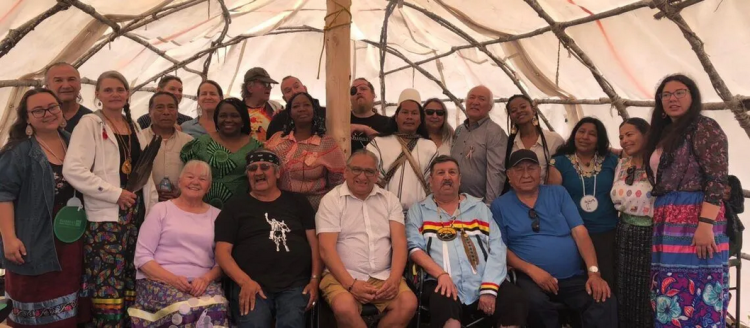Algoma University's Faculty of Cross-Cultural Studies, in partnership with the Institute of Peoples, Territories, and Pedagogies for Peace (IPTP) recently hosted The Peoples Diplomacy, Environmental Governance, and Self-determination Delegation. This initiative aims to enhance commitments to the Special Mission, the TRC calls to action, and global decolonial education.

The delegation included Indigenous and Black-Afrodiasporic territorial authorities, land and water defenders, social leaders, educators, and activists from Colombia. Their visit highlighted the roles of Indigenous and AfroDescendant communities in peace-building, self-governance, and justice. Supported by over 20 organizations from Canada, Colombia, Bolivia, and South Africa, the delegation focused on grassroots governance and education.
The Equity, Diversity and Inclusion (EDI) Office, Visual Arts Program, Shingwauk Kinoomaagee Gamig (SKG), the African Caribbean Canadian Association of Northern Ontario (ACCANO), and the Indigenous Womens Anti-Violence Task Force (IWAVTF) also took part in this initiative.
The situation for many Indigenous and afrodescendant and territories communities is critical. They are disproportionately affected by violence, large-scale extractive projects, and ongoing structural racism while playing an important role in the construction of peace through efforts of the Ethnic Commission for Peace and Defense of Territorial Rights and other representative bodies including self-governance processes at the territorial level. As such, the delegation centred on strategies to strengthen Indigenous and Black political and territorial governance, leadership and environmental protection, peacebuilding, and decolonizing education to address historical and contemporary determinants of violence.
The week-long visit saw exchanges facilitated between representatives from Batchewana First Nation and the Arhuaca Nation from Northern Colombia, the Amazon region, the Colombian South Pacific and Northern Cauca. Dialogues centered on water and land rights, food sovereignty, women's roles in healing, peace-building and biodiversity protection. Participants included Indigenous and Afro-descendant counterparts from Bawaating, Six Nations, Ottawa, and various regions of Colombia and Bolivia, as well as representatives from Senegal, South Africa, and Ghana.
Activities included ceremonies at SKG and Lake Superior, a display of artists' work from Canada, Colombia, and Bolivia related to environmental governance, relationships to and the rights of nature, including various public webinar sessions. A welcome dinner at Algoma University's SpeakEasy and a dinner hosted by ACCANO and the EDI Office were also part of the events.
Notable participants included four members of the IPTP Council of Elders and Experts, including Dr. Beverly Jacobs, Kanienkehaka-Mohawk of Six Nations, Senior Advisor to the President on Indigenous Relations and Outreach at the University of Windsor, and Associate Professor in the Faculty of Law; Sahada Alolo, Executive Member of the African Canadian Association of Ottawa (ACAO), and Founder/President of the Northern Girl Initiative; Elizabeth Garcia, Ambassador to Colombia in Bolivia, Arhuaca Nation, and IPTP Council Chair; and Dean Sayers, former Chief of Batchewana First Nation and Chair of SKG Board of Directors. Diplomatic exchanges were also initiated with Chief Mark McCoy of Batchewana First Nation, which will be built upon in the coming period.
An intensive CESD spring institute course "Decolonizing peace in Colombia in a global context: rights of territory, nature, and people's self-determination" was held concurrently, providing students with direct engagement opportunities with international and local knowledge holders, co-taught by Dr. Sheila Gruner and Professor Sophie Edwards.
The delegation's visit reinforced relationships between First Nation, Indigenous, and Afro-diasporic communities, Algoma U faculty, students, and the broader community, advancing the university's commitment to decolonial education.
The IPTP is an independent, global institute supporting communities, decolonial education, and research centering on self-determination, environmental governance, and peacebuilding, supporting cross cultural education involving communities and educational institutions.
Quotes
Sheila Gruner, Chair, Faculty of Cross-Cultural Studies, Director, Institute of Peoples, Territories, and Pedagogies for Peace (IPTP)
"The delegation demonstrated that intercultural dialogue and decolonizing education at the most grassroots level involves building relationships, mutual understandings about land dispossession, reclamation and cultural-territorial integrity, establishing routes forward for a real peoples diplomacy. The week-long activities and outcomes demonstrated the incredible capacity that is so often overlooked in governance and decision-making about water, territorial defense, peace and biodiversity protection. We were honoured to have the delegates from Colombia join in conversation with local knowledge holders, educators, leaders, authorities, and others to develop a long-term commitment to continue these efforts."
Clemencia Herrera, Indigenous Muruimunia, Coordinator of the National Indigenous Training School, National Indigenous Organization of Colombia (ONIC)
"During the meeting of diplomacy and inclusion of peoples in Canada, the diplomacy of interculturality, knowledge, and wisdom, the best way to educate people for life, and for the resistance of peoples, was identified as the best strategy to continue with inclusion."
Sahada Alolo, IPTP Council Member, President of the Ottawa Muslim Women's Organization, and an Executive Member of the African Canadian Association of Ottawa
"Being part of the international delegation on Peoples' Diplomacy, Environmental Governance, and Self-Determination was both enriching and sobering. This delegation provided a platform for Indigenous, Afro-Colombian Peoples, and other leaders to learn, share, and explore strategies for protecting land and water rights, promoting decolonial education, and highlighting the roles of women and communities in peacebuilding, among other important topics. I eagerly anticipate our continued work with the Institute for Peoples, Territories, and Pedagogies for Peace to foster future collaborations."
Marlin Mancilla, AfroColombian Land Defender, Member of the Mobilization of AfroDescendant Women for the Care of Life and Ancestral Territories
"We are very grateful for our visit to Canada, invited by Algoma University and the IPTP; in which, as ethnic peoples, we were able to exchange experiences and knowledge with academics and Indigenous peoples who maintain their legacy. We believe that, in the diversity of thoughts and cosmovisions are the guarantees to safeguard life on the planet. It is necessary to continue expanding networks, meetings and dialogues between peoples is the key of diplomacy between peoples to ensure environmental justice. Thank you for opening your doors."
For Photos click here.










